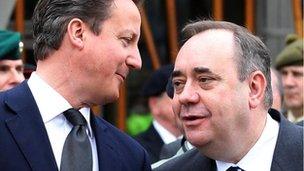Scottish independence: Referendum deal goals 'achieved'
- Published

The Scottish and UK governments have both said they have achieved what they wanted from negotiations for an independence referendum.
Secretary of State for Scotland Michael Moore told the BBC the agreement would allow the debate to get under way.
Meanwhile, Deputy First Minister Nicola Sturgeon said the details meant the ballot would be "made in Scotland".
On Monday, Prime Minister David Cameron and First Minister Alex Salmond will meet in Edinburgh to sign the deal.
Over the past month, Ms Sturgeon has held talks with Mr Moore on a referendum expected to be held in the autumn of 2014.
The deal they produced, to be approved by Mr Cameron and Mr Salmond, will centre around a single Yes/No question on whether Scotland should leave the UK.
The UK government is expected to grant limited powers for the Scottish Parliament to hold a legal referendum, under a mechanism called Section 30.
It is also believed the agreement will make provisions for 16-year-olds in Scotland to vote in the referendum, while the issue of campaign funding is still to be clarified.
Speaking to the BBC's Andrew Marr Show, Mr Moore said the vote would be the most important political decision in the UK for 300 years.
He said: "I think people can have confidence when they see that agreement, it will ensure that both governments' sets of objectives have been achieved."
The possibility of a second question on greater powers has been dropped, while the Scottish government looks set to have secured its preferred date of autumn 2014.
Mr Moore added: "I am very happy for us to take whatever length of time it requires to thoroughly investigate all these different issues.
"If you look at the key issues, about the economy about our security about our place in the world on all of these issues there's a very strong positive case for Scotland continuing to be part of the United Kingdom."
'Time to campaign'
He said he had no problems with 16- and 17-year-olds voting and he would like to see a debate on this being widened to include general elections in future.
The secretary of state added: "This has to be a straight-forward and fair process, a framework of rules that are accepted by all sides that will allow us to focus on the big issues."
Ms Sturgeon said her negotiations with Mr Moore reached a position which she was "very satisfied" with.
She told BBC Scotland's Sunday Politics Scotland programme she had no problem with the deal coming ahead of the results of the Scottish government consultation on the referendum.
She said: "The agreement that will be signed, if approved by the prime minister and first minister tomorrow, is for a Section 30 order that will transfer power to the Scottish Parliament.
"It will then be for the Scottish Parliament to decide the date, the question, the franchise for the referendum and the consultation will be very influential in the Scottish Parliament reaching those decisions."
Ms Sturgeon added: "We've compromised, as have the Westminster government in these negotiations, but I'm very satisfied indeed that the outcome of these negotiations is the guarantee of a referendum made in Scotland.
"If you cast your mind back to the start of this year David Cameron wanted to debate the timing, the wording of the question and the franchise - as a result of the negotiations we've had and the agreement that will be signed this is a referendum that will be firmly made in Scotland."
Blair Jenkins, who is running the Yes Scotland campaign, told the programme the deal was a landmark for Scotland.
He said: "It's fantastic to be at this stage where we can now move on to the substance of the debate and start setting out the compelling case for Scottish independence.
"We relish the fact that we are now going to have this historic opportunity, that we are going to be the first generation of Scots that are going to get the chance to vote on self determination for Scotland, we are absolutely ready to begin that campaign."
But former Labour chancellor Alistair Darling, who is leading the Better Together campaign against Scottish independence, said it was now time to cut through the "bluster and nonsense" and get on to the merits of the argument.
He said: "If you look at the evidence over the last few months that is an argument that we can win, I'm afraid we've got a 100 months ahead of us before we actually get into the polling stations.
"I think if we can put those arguments across convincingly and people can see that they are better as part of the UK, both British and Scottish together then I think we can win those arguments."
Result concerns
Meanwhile, one of Scotland's foremost political academics, Professor James Mitchell of Strathclyde University, warned that the single question referendum could still see an unclear result.
He said: "It's possible there could be a majority for yes which would include people that voted yes not because the want independence but because they want more powers and it isn't available.
"Equally it is quite likely that there will be a majority of no voters who will include those who want more powers and don't want the status quo and the question is - how do we interpret that result?
"If you're going to have a referendum it needs to be beyond dispute how you interpret that result and I don't think that's likely to happen as currently envisaged and without a lot more information."
- Published12 October 2012
- Published10 October 2012
- Published9 October 2012
- Published10 October 2012